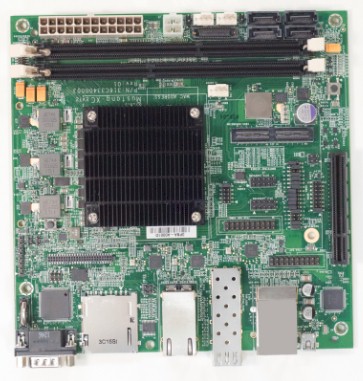Dell Fires Up A Bevy Of 64-Bit ARM Servers For Developers

People have been talking about 64-bit ARM server processors for so long that it is tough at times to remember that they actually have not existed until fairly recently. Applied Micro is just starting to sample its first X-Gene 1 chips now, and AMD is getting set to do so in March with its Opteron A1100 if all goes well. There will be far more people who want to get their hands on the first few samples than chips to be handed out. So server makers and software developers are either going to have to arm-wrestle for them or share.
To that end, Dell's Data Center Solutions group, which makes custom servers for the likes of Microsoft and other giant cloud builders and Web 2.0 hyperscale application providers, has gotten its hands on a bunch of the eight-core X-Gene 1 processors from Applied Micro and put them into 1U rack servers it has dubbed "Mustang," so named after the development boards that Applied Micro launched last October. These boards sport a single X-Gene 1 chip, which has eight cores, plus DDR3 main memory, 10 Gb/sec Ethernet ports, SATA 2/3 peripheral ports, and USB 3.0 ports.
The Dell Mustang proof-of-concept servers have 16 GB of main memory and four hot-plug SATA drives. These Mustang servers are not in any way meant to be a hyperscale, super-dense server design, but rather a development platform on which software developers wanting to port their Linux applications from X86 to ARM processors can do their ports and testing. Hyperscale customers wanting to take their homegrown code and port it from X86 to ARM are also being invited to take an X-Gene 1 server out for a spin. This is a whole lot better than the massive FPGA-based simulators that very early customers had to use to simulate the X-Gene chip before first silicon came back from Taiwan Semiconductor Manufacturing Corp.
The Mustang boards from Applied Micro support Canonical's Ubuntu Server 13.10 release, which came out at roughly the same time as the X-Gene boards last year, and will be able to run the upcoming Ubuntu Server 14.04 LTS (short for Long Term Support) release due this April. Dell has fired up the experimental machines using Red Hat's latest Fedora 20 development release, but you can probably get a machine reconfigured with Ubuntu Server if you ask nicely. (Both the Fedora project and Canonical were working very closely with ARM server front-runner Calxeda to tune their Linuxes for Calxeda's initial 32-bit "High Bank" and 40-bit "Midway" processors, but then Calxeda ran out of money and closed its doors last December and there went all of that work.) Applied Micro also has a tuned up version of Fedora that it has put together for the Mustang development boards that can be installed on the Dell Mustang servers.
Greg Weir, senior product manager for the Data Center Solutions group at Dell, tells EnterpriseTech that 30 of these machines have been put around its hosting and solution centers around the globe, and those wanting to do software development and testing should contact DCS or the office of the CTO, where Weir works, to get a time slice on one of the Mustang boxes. On average, says Weir, he expects software developers to want a machine for a week, with some taking a bit longer than that and others only needing a day or two.
The one thing that Weir cannot predict is when Dell's hyperscale customers will actually adopt ARM servers. The reason is simple: They don't know until they test their software, and this is the first taste of 64-bit ARM iron in the world – outside of the Apple A7 chip that is at the heart of the iPhone 5S, launched last September.
"Most of our customers, this will be very workload driven, and ARM servers could be used for cold storage, Hadoop, or Web serving," explains Weir. "For right now, we are mostly having discussions, and for them to go to the next level, they need to have hardware to test with. I think that we are a few months away from getting the results of those tests that will answer that question. It is not just the hardware – you need the rest of the ecosystem out there, whether it is Hadoop or whatever."
Once the software has been tested by the big hyperscale customers, then the DCS engineers can come up with a precise hardware design to meet the requirements of the workload. Should this come to pass – if the X-Gene 1 chip can compete against Xeon and Atom alternatives effectively – you can bet that any design will cram more than one X-Gene 1 processor in 1U of rack space.











